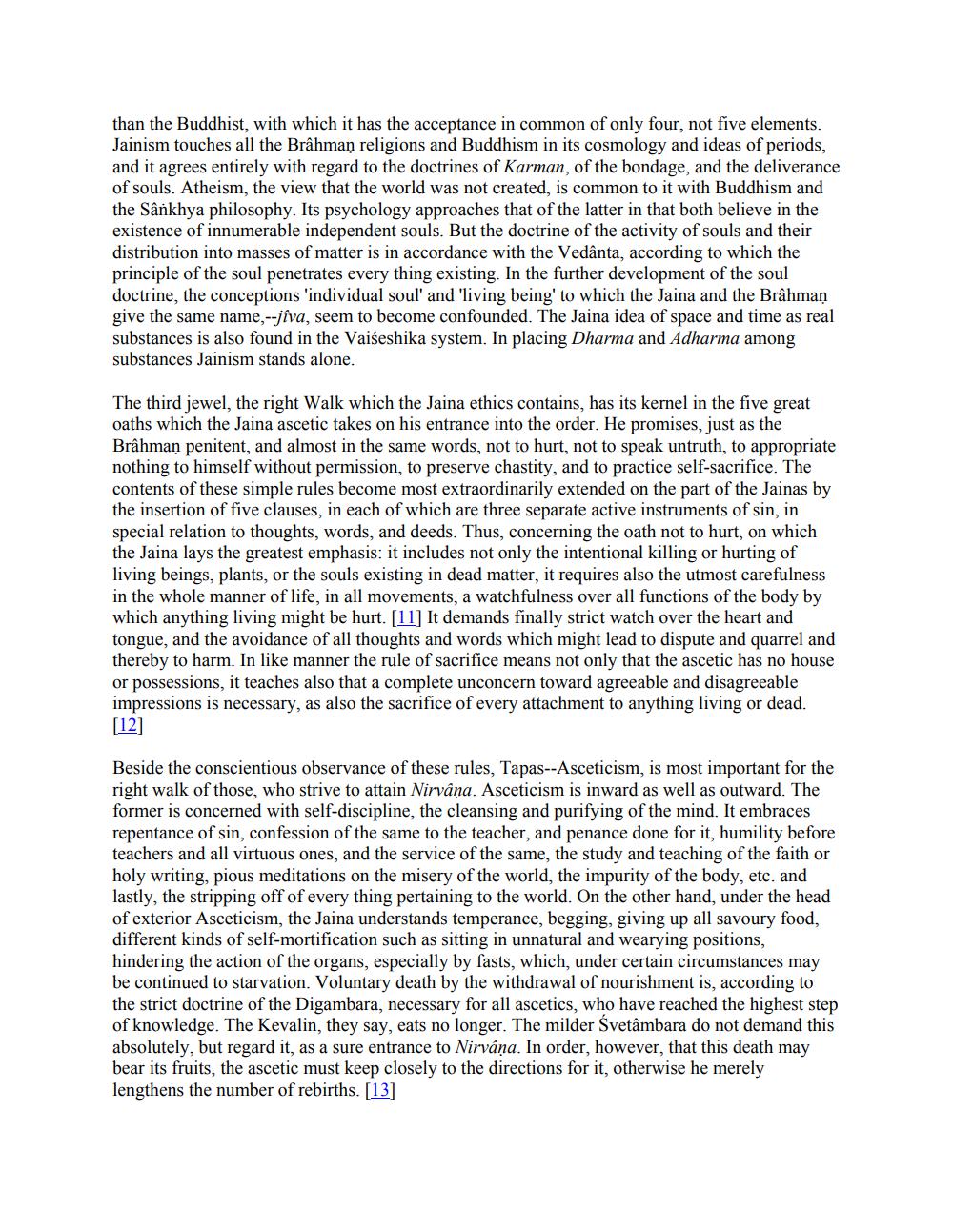________________
than the Buddhist, with which it has the acceptance in common of only four, not five elements. Jainism touches all the Brahman religions and Buddhism in its cosmology and ideas of periods, and it agrees entirely with regard to the doctrines of Karman, of the bondage, and the deliverance of souls. Atheism, the view that the world was not created, is common to it with Buddhism and the Sankhya philosophy. Its psychology approaches that of the latter in that both believe in the existence of innumerable independent souls. But the doctrine of the activity of souls and their distribution into masses of matter is in accordance with the Vedanta, according to which the principle of the soul penetrates every thing existing. In the further development of the soul doctrine, the conceptions individual soul' and 'living being' to which the Jaina and the Brahman give the same name, --jiva, seem to become confounded. The Jaina idea of space and time as real substances is also found in the Vaiseshika system. In placing Dharma and Adharma among substances Jainism stands alone.
The third jewel, the right Walk which the Jaina ethics contains, has its kernel in the five great oaths which the Jaina ascetic takes on his entrance into the order. He promises, just as the Brâhman penitent, and almost in the same words, not to hurt, not to speak untruth, to appropriate nothing to himself without permission, to preserve chastity, and to practice self-sacrifice. The contents of these simple rules become most extraordinarily extended on the part of the Jainas by the insertion of five clauses, in each of which are three separate active instruments of sin, in special relation to thoughts, words, and deeds. Thus, concerning the oath not to hurt, on which the Jaina lays the greatest emphasis: it includes not only the intentional killing or hurting of living beings, plants, or the souls existing in dead matter, it requires also the utmost carefulness in the whole manner of life, in all movements, a watchfulness over all functions of the body by which anything living might be hurt. [11] It demands finally strict watch over the heart and tongue, and the avoidance of all thoughts and words which might lead to dispute and quarrel and thereby to harm. In like manner the rule of sacrifice means not only that the ascetic has no house or possessions, it teaches also that a complete unconcern toward agreeable and disagreeable impressions is necessary, as also the sacrifice of every attachment to anything living or dead. [12]
Beside the conscientious observance of these rules, Tapas--Asceticism, is most important for the right walk of those, who strive to attain Nirvâņa. Asceticism is inward as well as outward. The former is concerned with self-discipline, the cleansing and purifying of the mind. It embraces repentance of sin, confession of the same to the teacher, and penance done for it, humility before teachers and all virtuous ones, and the service of the same, the study and teaching of the faith or holy writing, pious meditations on the misery of the world, the impurity of the body, etc. and lastly, the stripping off of every thing pertaining to the world. On the other hand, under the head of exterior Asceticism, the Jaina understands temperance, begging, giving up all savoury food, different kinds of self-mortification such as sitting in unnatural and wearying positions, hindering the action of the organs, especially by fasts, which, under certain circumstances may be continued to starvation. Voluntary death by the withdrawal of nourishment is, according to the strict doctrine of the Digambara, necessary for all ascetics, who have reached the highest step of knowledge. The Kevalin, they say, eats no longer. The milder Svetâmbara do not demand this absolutely, but regard it, as a sure entrance to Nirvana. In order, however, that this death may bear its fruits, the ascetic must keep closely to the directions for it, otherwise he merely lengthens the number of rebirths. [13]




